The 2012 MacBook Air (11 & 13-inch) Review
by Anand Lal Shimpi on July 16, 2012 12:53 PM EST- Posted in
- Apple
- Mac
- MacBook Air
- Laptops
- Notebooks
Things are getting very blurry.
The MacBook Pro once stood for tons of power plus upgradability. Add a Retina Display and now it's just tons of power. It's a thicker, faster MacBook Air (with an awesome display). It's not bad, in fact it's quite amazing, but it confuses the general order of things.
The MacBook Air doesn't help in the clarity department. You can now order a MacBook Air with up to 8GB of RAM and a 512GB SSD, for the first time in MacBook Air history. Users who were once forced into Pro territory because of RAM and storage requirements can now happily live with an Air. And thanks to Turbo Boost, you do get similar performance in lightly threaded workloads.
Take a step away from the Mac world and you'll see the rest of the market is going through its own confusing period. Nearly every single Microsoft partner is mixing tablets and Ultrabooks. If your tablet uses smartphone hardware, and can dock into a notebook or Thunderbolt itself into a desktop, is all of this a lot of confusion before client computing moves entirely to smartphones? NVIDIA said it would happen publicly (even Intel did so privately a few years ago). Maybe it wasn't just convenient rhetoric. Maybe that's where we're headed. Until then, there are going to be a lot of different form factors, all with very compelling features. The MacBook Air continues to be one of them.
Despite the recent Ultrabook frenzy, the MacBook Air was one of the first (if not the first) to marry performance with usability, screen size/resolution, portability and battery life. Ultraportables prior to the MacBook Air's arrival in 2008 typically sacrificed in one or more of the above areas. I spent years in pursuit of the perfect ultraportable in college over a decade ago (30 is the new 20 right?), and generally came away disappointed and empty handed.
In 2010 Apple changed the expectations of cost with the MacBook Air. The new 11-inch model would start at just $999. And the 13-inch would only cost $300 more. The very first MacBook Air, by comparison, retailed for $1800. Apple took an ultraportable and made it its mainstream notebook. It was a bold move but one that was very forward looking.
Today the MacBook Air is even more affordable. The 11-inch model still starts at $999, but the 13-inch version is only $200 more. From the outside not a lot has changed, but that doesn't mean there's any less to talk about. Ivy Bridge, USB 3.0 and faster SSDs are all on the menu this year. Let's get to it.
The 11 & 13
Unlike the other thin member of Apple's Mac lineup, the MacBook Air chassis hasn't changed over the past three years. Since the 2010 update that gave us the 11-inch model and significantly lower prices, Apple has stuck with a design that only recently has seen widespread emulation.
While our last review focused on the beginning of a new generation, this review takes a look at a very mature, yet still very good design. The MacBook Air is just so pleasant to carry around. It'll make even the new rMBP feel like a pig.
Both the 11 and 13-inch models are effortless to carry around. While I dread traveling with a traditional notebook, slipping one of these into my backpack is barely noticeable. You can get used to and take for granted just about anything, but the form factor of the MacBook Air continues to be a favorite of mine even today.
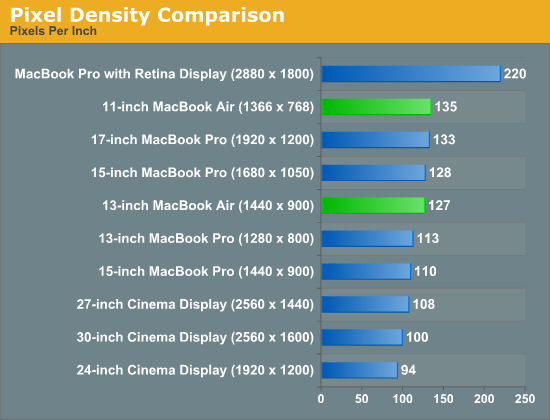
The 11-inch MacBook Air is a great option for those who want the portability of a tablet but find themselves wanting to attach a keyboard to it most of the time. The 11.6-inch display boasts the highest pixel density of all of Apple's non-retina displays at 1366 x 768, but it's still quite usable. You don't make any sacrifices on keyboard size or key spacing (it's identical to the 13-inch model for the majority of the keys), nor do you have to give up any performance either. Apple offers all of the same CPU, memory and storage upgrades across both MacBook Airs. And with no discrete GPU, thermal throttling isn't really a problem either in the 11-inch chassis. With Thunderbolt, the 11-inch MacBook Air can actually give you the best of both worlds: an incredibly portable computer when you're on the go, and enough to act as your desktop when docked to a Thunderbolt Display.
I've traditionally always bought the 11-inch MacBook Air with the thought that I'd carry it when I didn't need to lug around my MacBook Pro. I seemed to be fooling myself however as over 90% of the time I'd end up with the MacBook Pro. The 11-inch Air was relegated to typewriter duty when I needed a change of scenery while writing at home. It's a great writer's companion, but if I couldn't have more than one system I'd have to opt for its bigger brother.
When I first reviewed the redesigned 13-inch MacBook Air I wrote that it felt more like a normal notebook, while the 11 was something a bit more unique. Perhaps I was more infatuated with the new 11 at the time, because these days I'm more drawn to the 13-inch MacBook Air as the notebook to have if you can only have one.
You get a 23.5% increase in screen resolution on a display that's just easier to look at. While 1440 x 900 is a bit much on a 15-inch MacBook Pro, I'd say it's near perfect on the 13-inch Air. If Apple were to do the Retina treatment on here, it'd be magnificent.
The larger chassis allows room for an SD card reader, which is thankfully quite functional. Otherwise the port layout is identical to the 11-inch model.
| 2012 MacBook Air Lineup | ||||||
| 11.6-inch | 11.6-inch (high-end) | 13.3-inch | 13.3-inch (high-end) | |||
| Dimensions |
H: 0.11-0.68" (0.3-1.7cm) W: 11.8" (30cm) D: 7.56" (19.2cm) |
H: 0.11-0.68" (0.3-1.7cm) W: 12.8" (32.5cm) D: 8.94" (22.7cm) |
||||
| Weight | 2.38 lbs (1.08kg) | 2.96 lbs (1.35kg) | ||||
| Cores/Threads | 1.7GHz dual-core Core i5 | 1.8GHz dual-core Core i5 | ||||
| Base Clock Speed | Intel HD 4000 | |||||
| RAM | 4GB DDR3L-1600 | |||||
| SSD | 64GB SSD | 128GB SSD | 128GB SSD | 256GB SSD | ||
| Display Resolution | 1366 x 768 | 1440 x 900 | ||||
| Ports | Thunderbolt, 2x USB 3.0, headphone jack | Thunderbolt, 2x USB 3.0, SD card slot, headphone jack | ||||
| Price | $999 | $1099 | $1199 | $1499 | ||
In its role as a proponent of simplicity, Apple has reduced the decision between what Air to get down to screen size, resolution and battery life (the 13-inch chassis houses a much larger battery). If you like having more of all of those things, the 13-inch Air is for you. If carrying anything larger than a tablet upsets you, buy the 11.


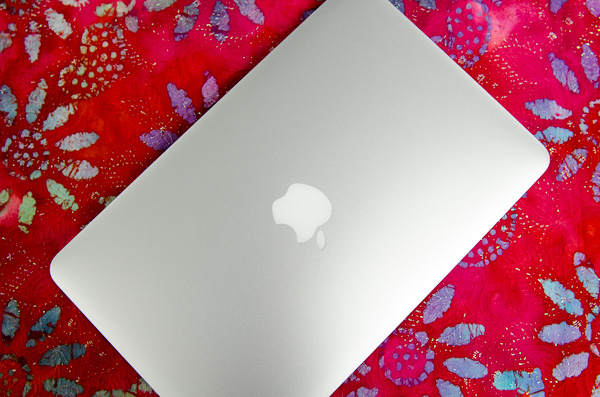
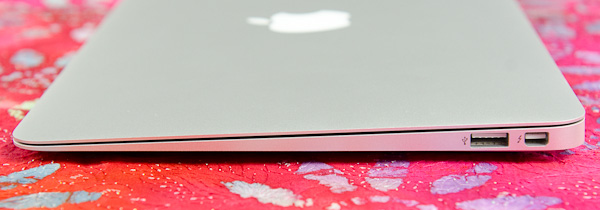
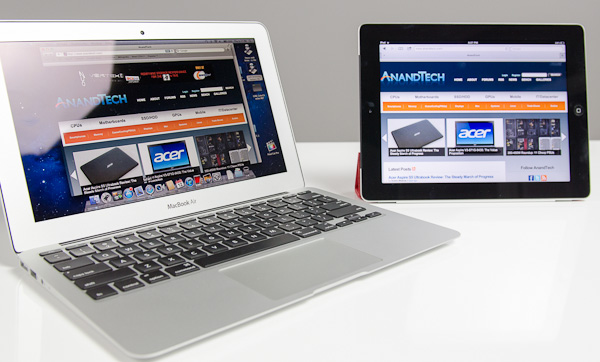
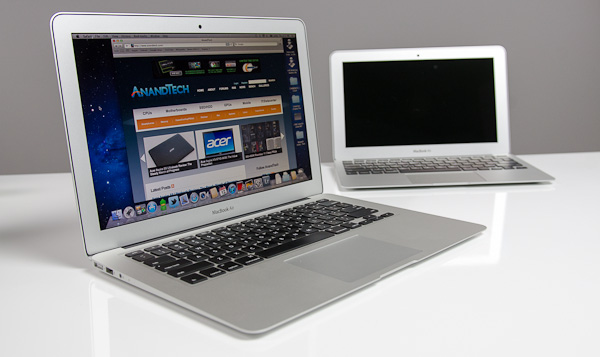














190 Comments
View All Comments
MrJim - Tuesday, July 17, 2012 - link
Thanks for the reply sir!I would like "ultra small form factor removable DRAM standards" and i think many of us would. But it also seems for me that this is part of a corporate strategy, car makers have done this for years. "You can only buy stuff from us, good quality we promise, and of course alot more expensive than some of the other 200 makers of that perticulur car engine part".
To say the least for changing batteries. And i did expect you to sit on information that we ordinary people doesnt have. Im looking forward to the future, but i like choice thats all.
Karltheghost - Tuesday, July 17, 2012 - link
Sure you're right. If i buy a Notebook, it is less serviceable than a full size desktop PC. And if i buy an Ultrabook it is even less serviceable. But being able to change the only wearing part in an expensive part of Elecronics, that is not likely to last as long as the rest of the Laptop is the least i want to do. By the way it's the same for Smartphones. I just don't want to buy a product which i need to replace completely if the battery wears out because i cannot change it myself and having it replaced is nearly as expensive as a new Laptop/Smartphone. And because there are manufactors who sell Smartphones and Ultrabooks with changeable batteries, your argument, as far as it goes to batteries, is not very convincing. As for other parts you're right, demanding switchable CPUs or something like that in an Ultrabook would be hilarious.KPOM - Tuesday, July 17, 2012 - link
There are more and more Ultrabooks sold with non removable batteries now. The Samsung Series 9 is one example.Tegeril - Monday, July 16, 2012 - link
"Very disappointed Anand. Very disappointed with you."Hilarious.
The MBA is still a class leading entry in the ultraportable market. It no longer wins in every single category (see: display), but that does not mean it is not a great system.
You ignore things like consumer SSDs being consumer SSDs in large packages without custom manufacturing. Apple's memory upgrades have always been more expensive than retail and have actually come closer to reality recently. But again, this is not a stick of mass produced memory, it's not an apples to apples comparison. As far as overcharging in any other area of the system, you fail to accurately include chassis, trackpad, magsafe, and other superior elements that can't be compared in the way you want to do spec to spec comparisons.
Being melodramatic about this review is what's disappointing. It very accurately describes why Apple is selling these and their pro systems so much more successfully than in the past. They're very good systems.
KoolAidMan1 - Monday, July 16, 2012 - link
The Apple haters are out in force, as usual.So mad.
Karltheghost - Tuesday, July 17, 2012 - link
So everyone who criticises Apple is automatically a hater? Seems like you're as differenciating as the haters . . . In fact, there are plenty of people out there who had an apple product and are therefore not very fond of apple. For example i bought an Ipod because i wanted a good Mp3-player. It did everything except from playing Mp3s in a proper way and i wasn't the only one who had this issue (Referring to an Ipod nano 3g, the bad sound without equalizer and the scratching noises with equalizer turned on).And i know a lot of people who sold their Macbook Pros 2 weeks after purchasing and bought regular windows machines because there are flaws that the technical specs don't reveal . . .
KPOM - Tuesday, July 17, 2012 - link
"Macs are garbage and I should know because I bought an iPod once and it didn't work right, plus my friend returned a MacBook Pro 2 weeks after buying it." These are anecdotes.It's OK to criticize Apple. Heck, the original MacBook Air got a lot of criticism from hard core Mac fans when it first came out. However, few company's products inspire the fierce criticism that anything Apple puts out does.
I get the sense that if Apple stuck its logo on hardware completely identical to an ASUS Zenbook or Samsung Series 9, there would be 6 pages of comments on this site from many of the Apple bashers criticizing every little flaw, but when the actual product reviews come out those same people won't be posting anything but praise for the product.
Karltheghost - Tuesday, July 17, 2012 - link
Of course that are anecdotes, hence i wrote "For example" at the beginning . . .But actually i rely more on my personal experience and that of others, by whom i know what they're doing with their stuff than on some fanboyspeech (this is not intendet as criticism for this review). What i can say is that i made bad experiences with apple and friends too and there are much more bad experiences than good ones. So i am very sceptical. On the other hand i had very bad experiences with other brands too (e.g. i had 2 HP Notebooks that lastet less than 3 months), but there are plenty of others who hadn't problems for years. So what i'm referring to is kind of a good/bad-balance . . .
It's not that i wouldn't buy a product just because it has an apple on it. In fact i would buy one if it fulfills my needs. But as long they're charging premium prices for machines that you can literarily throw away as soon the warranty runs out and have horrible software restrictions i'll stick with the bulky, ugly things that other manufactures are producing
KPOM - Tuesday, July 17, 2012 - link
What makes an Apple a throwaway product after a year? It still functions. My sister has a 2006 MacBook that is in almost new condition (though she hasn't used it much since getting a 2011 MacBook Air).Also, there are no software restrictions on OS X. Even with Mountain Lion, you can purchase and install your own software. This isn't iOS or Windows RT, where you must purchase from an App Store. The Mac App Store is optional.
Sure, it won't run Windows as good as a PC with the same specs will, but it will run pretty well. I think what most Mac users who run Windows find is that over time, they use Windows less and less, perhaps just for that old program that just doesn't have a Mac equivalent. Heck, even Windows 7 includes an "XP Mode" to run XP in virtualization, so it isn't unique to the Mac. I can quibble a lot about how Microsoft has "crippled" support for 16-bit apps, or how the 64-bit version dropped support for some old peripheral that worked just fine in XP.
Karltheghost - Tuesday, July 17, 2012 - link
Just personal experience. After 2 Years or so most products get faulty, even if it's just the battery or a fan. On most Apple products you can't change that yourself as it's tightly integrated in the system and for example, a friend of mine payed 170€ just for a new iphone battery . Thats a financial write-of.With software restrictions i was referring to the windows/linux thing. The only reason windows runs slow is that apple provides bad drivers so you stick with osx.
A bunch of horses won't get me to use OSX, i tried it once and it felt like a cage where the restrictions are covered by a lot bling-bling animation. While there are some nice things about it, like the touchpad integration you have even less system access than under windows. Nothing to convince a linux user and also nothing to replace windows on the gaming machine ;)
The license agreement does the rest (yeah, i actually read that thing)